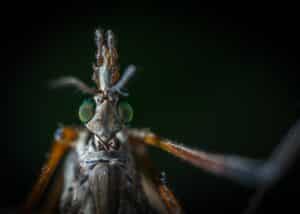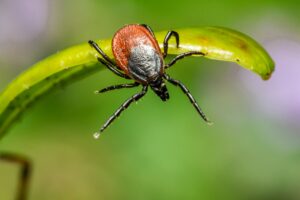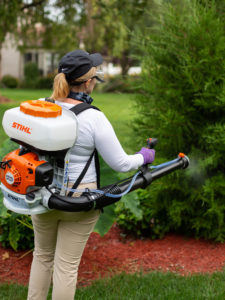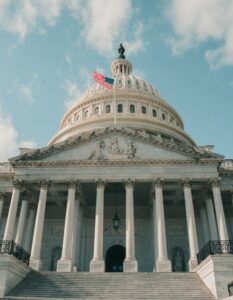At least 10 state legislatures are considering bills that will impact pest control and lawn care businesses. At the bottom of this post, I will summarize each of these bills and provide links.
Most of this post will focus on two bills –
- Illinois H 3118 – A pyrethroid pesticide may only be applied by a commercial applicator after an evidence-based threshold has been met.
- Minnesota S 201 – Authorizes cities to adopt certain pesticide control ordinances. (rules more restrictive than current state or federal rules).
These two bills are important because they could be models for other state legislatures and their provisions can be easily copied across the country.
Why should you care about - Illinois H 3118?
The rule as currently proposed will make it more difficult to apply a pyrethorid based insecticide in people’s backyards.
(Note: Since Stop The Bites! is a Natural product. None of the proposed rules will impact your ability to use it. If you are using STB for all your treatments, you can relax as you read the rest of this article.)
It says a pyrethroid pesticide may only be applied by a commercial applicator for commercial or residential treatments if an evidence-based model is used. The details of the evidence-based model are still to come, but I presume it will be some type of trapping threshold. It will likely require data management and record-keeping for the trap counts, in addition to the current record-keeping tied to pesticide applications.
Very important for many of you reading this blog — IT MAY NOT BE APPLIED USING A SUBSCRIPTION-BASED MODEL OF TREATMENT.
Other goodies included in the proposed legislation:

- Document the species targeted with the treatment – (you going after Ae. vexans? or Culex tarsalis? What was in your trap?)
- An inspection of the property for mosquito sources is conducted before the application of a pyrethroid pesticide. – (This is a best practice that we should all be doing anyway.. TBH)
- The commercial applicator has undergone the course and licensure requirements under subsection C — (FYI- includes – a course-specific to protecting pollinators (Yay! I 100% support this) 2) Requirements for domestic inspections 3) How to collect surveillance evidence 4) Mosquito ID 5) mosquito life stages 6)pesticide-free source reduction methods 7) bystander protection 8)product label requirements 9) anything else the agency deems relevant. )
- Can’t apply pyrethroids if winds are over 3 miles per hour. — In Illinois, in the summer. So you have about 7 days per summer you can apply. This is the prairie, the wind blows every day.
- 24 hrs before the treatment you must notify the neighbors of the property where the application will take place.
- For 24 hours AFTER the treatment of the pyrethroid, there must be yard signage visible.
- The applicator must have the product label available while the treatment is occurring.
- The owner of the property must be given a copy of the label.
Why are they making it so hard to spray pyrethroids?
Some people and companies have not been using best practices for pyrethroid use. Because of this, we are seeing more and more pyrethroid resistance in the U.S. As we have blogged about on this site a few times.
Also, there have been complaints that many people spraying marketed for mosquitoes and ticks with pyrethroids are not targeting their sprays in the right ways. They are indiscriminately “spraying and praying”. These complaints are gaining traction and we have seen the introduction of this proposed legislation.
If you are only treating with Stop The Bites! - you are good to go, no worries.
Stop The Bites! is a natural product based on essential oils. So… none of the info about pyrethroids and the increased scrutiny will apply to users of STB.
Why should you care about - Minnesota HF 718?

This rule says that local jurisdictions in Minnesota can restrict the use of any pesticide with a pollinator warning box. So… this basically means any synthetic mosquito or tick product currently in use.
(Note: If you use Stop The Bites! – you can relax. We do not have a pollinator warning box. So, you are good to go.)
What about Wisconsin Public Intervenor v. Mortier
Yeah, I know, right?!?!? — Back in 1991 when the supreme court settled Wisconsin V. Mortier . The high court ruled that states COULD set pesticide laws more restrictive than the EPA. And of course, immediately, many states passed laws in the next legislative session saying that in their particular state, “No law shall be more restrictive than the rules established by EPA”… (obviously paraphrased). This happened especially quickly in key agricultural states…… like Minnesota. Eventually, 43 states passed laws like this, taking away the ability of local communities to regulate pesticides.
The battle for local control of pesticide regulation is happening across the U.S.
In Minnesota, the Twin Cities metro area is growing at 9% while the rest of the state population is growing at 3% (since 2010). This is shifting the balance of power away from the rural, agricultural areas towards the urban areas. Of the 5.6 million people in Minnesota, 3.6 million live in the Twin Cities.
The desire for local control of pesticide regulations is being driven by:
- Pollinator safety – (restricting neonicotinoids)
- Human health concerns – (Roundup/Glyphosate awareness)
Many newly elected state legislators across the U.S. have tried to introduce bills limiting the use of Neonicotinoids and/or Roundup/Glyphosate.
And they ran smack into the 30-year-old laws limiting their ability to pass restrictive pesticide legislation. The wheels of law-making turn slowly, but little by little these rules are being looked at with a more critical view.
Consequently, there are about 49 bills across the U.S. in state legislators restricting the use of neonicotinoids. Most of them are aimed at protecting pollinators.
Conclusion
State laws have a way of sweeping across the U.S. We see it time and time again.
There is a large and sustained movement away from synthetic pesticides. Even if these two bills fail to pass in 2021, the motivation for introducing these bills is not going away.
You should prepare for the future and add a Natural product to your toolbox. Or… better yet, switch away from synthetic pesticides entirely and go exclusively with Natural products.
Addendum - Additional bills of note. Including a short summary and links to the complete text of the bill. Note some traditionally agricultural states moving to restrict pesticides.
Arizona
AZ S 1275
2021
Pesticides Sale and Use Restrictions
Status: Pending – Senate Natural Resources, Energy and Water Committee
Date of Last Action:* 1/21/2021
Author: Gabaldon (D)
Topics: Wildlife-Pollinators
Summary: Relates to pesticides: sale and use restrictions.
AZ H 2093
2021
Pesticides Sale And Use
Status: Pending – House Land, Agriculture and Rural Affairs Committee
Date of Last Action:* 1/11/2021
Author: Dalessandro (D)
Topics: Wildlife-Pollinators
Summary: Relates to pesticides, relates to restricted sale and use.
California
CA A 567
2021
Pesticides: Neonicotinoids: Prohibited Use
Status: Pending – Assembly Environmental Safety and Toxic Materials Committee
Date of Last Action:* 2/11/2021
Author: Bauer-Kahan (D)
Topics: Wildlife-Pollinators
Summary: Prohibits the use of a neonicotinoid on a seed, as specified.
Illinois
IL S 2108
2021
Pesticide Act
Status: Pending – Senate Committee on Assignments Committee
Date of Last Action:* 2/26/2021
Author: Villa (D) Additional Authors: Murphy L (D)
Topics: Wildlife-Pollinators
Summary: Amends the Pesticide Act, adds and changes monetary penalties for specified amounts of violation points, provides that beginning on January 1, 2022, and every January 1 thereafter, the monetary penalties shall automatically be increased or decreased by a percentage equal to the percentage change in a specified document during the preceding 12-month calendar year.
IL S 2943
2021
Environmental Protection Act
Status: Failed – Adjourned – Senate Committee on Assignments Committee
Date of Last Action:* 2/4/2020
Author: Fowler (R)
Topics: Wildlife-Pollinators
Summary: Amends the Environmental Protection Act, provides that a pesticide applicator shall notify a beekeeper if the pesticide is applied within 3 Miles of the beekeeper’s colony registered with the Department of Agriculture under the Bees and Apiaries Act.
IL H 3118
2021
Environmental Protection Act
Status: Pending – House Rules Committee
Date of Last Action:* 2/18/2021
Author: Gabel (D) Additional Authors: Didech (D);Rohr (D);Croke (D);Hernandez B (D);West (D);Stava-Murray (D);Meyers-Martin (D);Mason (D);Howard (D);Gong-Gershowitz (D);Mayfield (D);Stuart (D);Mah (D);Guzzardi (D);Ammons (D);Moeller (D);Yingling (D);Cassidy (D);Mussman (D);Burke K (D)
Topics: Wildlife-Pollinators
Summary: Amends the Environmental Protection Act, provides that a pyrethoid pesticide may only be applied by a commercial applicator for commercial or residential use if evidence-based model of application complying with specified requirements is used, requires Agency to adopt rules creating a process meeting specified requirements for the licensure of commercial applicators for residential treatment of pyrethoid pesticides.
Iowa
IA S 52
2021
Sale or Use of Pesticides
Status: Pending – Senate Agriculture Committee
Date of Last Action:* 1/12/2021
Author: Jochum (D)
Topics: Wildlife-Pollinators
Summary: Prohibits the sale or use of pesticides containing a compound belonging to the neonicotinoid class of chemicals, makes penalties applicable, includes effective date provisions.
Kentucky
KY H 236
2021
Fertilizer and Pesticide Use and Application
Status: Enacted – Act No. 84
Date of Last Action:* 03/23/2021 – Enacted
Author: McPherson (R) Additional Authors: Bratcher (R);Heath (R)
Topics: Wildlife-Pollinators
Summary: Relates to fertilizer and pesticide use and application and making an appropriation therefor, relates to Documents Introduced Fiscal Impact Statement Local Mandate Bill Requests Number 855 Sponsors S. McPherson , R. Heath Summary of Original Version Repeal, mandates a regulatory program for regulating application and notice of application of pesticides for lawn care and mosquito control, removes language requiring the inclusion of pesticide application equipment.
Maine
ME H 111
2021
Use of Neonicotinoids for Outdoor Residential Use
Status: Pending – Concurrence
Date of Last Action:* 1/19/2021
Author: Grohoski (D) Additional Authors: Millett R (D);O’Neil (D);Zeigler (D);Dodge (D);Pluecker (I);Pebworth (D);Maxmin (D)
Topics: Wildlife-Pollinators
Summary: (Resolve) Directs the Department of Agriculture, Conservation and Forestry, Board of Pesticides Control to prohibit the use of any product containing certain neonicotinoids used for application in outdoor residential landscapes such as on lawn, turf or ornamental vegetation. The resolve also provides that products used for preserving wood, controlling or treating indoor insects and treating pets are specifically exempt from the prohibition.
Maryland
MD H 208
2021
Neonicotinoid Pesticides
Status: To Governor – Eligible for Governor
Date of Last Action:* 2/11/2021
Author: Healey (D) Additional Authors: Stein (D)
Topics: Wildlife-Pollinators
Associated Bills: MD S 375 – Crossfiled with
Summary: Relates to neonicotinoid pesticides.
Massachusetts
MA S 510
2021
Pesticide Board
Status: Pending – Joint Committee on Environment, Natural Resources and Agriculture
Date of Last Action:* 3/29/2021
Author: Cyr (D) Additional Authors: Barrett (D)
Topics: Water
Summary: Relates to the pesticide board, relative to the protection of groundwater sources of drinking water from pesticide contamination.
Minnesota
MN H 766
2021
Agriculture Additional Seed Label Information
Status: Pending – House Agriculture Finance & Policy Committee
Date of Last Action:* 2/4/2021
Author: Hansen (DFL) Additional Authors: Acomb (DFL);Feist (DFL);Jordan (DFL);Xiong (DFL);Vang (DFL);Morrison (DFL);Huot (DFL);Howard (DFL);Christensen S (DFL);Davnie (DFL);Lee (DFL);Carlson (DFL);Becker-Finn (DFL);Ecklund (DFL);Schultz (DFL);Sundin (DFL);Freiberg (DFL);Fischer (DFL)
Topics: Wildlife-Pollinators
Associated Bills: MN S 794 – Companion
Summary: Relates to agriculture, requires additional seed label information, prohibits certain seed uses, requires product stewardship for corn and soybean seed coated or treated with neonicotinoid pesticide.
Missouri
MO S 491
2021
Pesticide Certification and Training
Status: Pending – Senate Agriculture, Food Production and Outdoor Resources Committee
Date of Last Action:* 2/9/2021
Author: Bernskoetter (R)
Topics: Wildlife-Pollinators
Summary: Modifies provisions relating to pesticide certification and training.
MO H 1351
2021
Use of Glyphosate or Neonicotinoid Class of Pesticides
Status: Pending – HOUSE
Date of Last Action:* 2/25/2021
Author: Burton (D)
Topics: Wildlife-Pollinators
Summary: Prohibits the use of any glyphosate or any insecticide belonging to the neonicotinoid class of pesticides.
MO H 1369
2021
Neonicotinoid Class of Pesticides
Status: Pending – HOUSE
Date of Last Action:* 3/1/2021
Author: Rowland R (D)
Topics: Wildlife-Pollinators
Summary: Restricts the sale or use of any insecticide belonging to the neonicotinoid class of pesticides.
New Jersey
NJ S 74
2021
Pesticide Applicator Notification to Beekeeper
Status: Pending – Senate Environment and Energy Committee
Date of Last Action:* 1/14/2020
Author: Bateman (R) Additional Authors: Smith B (D)
Topics: Wildlife-Pollinators
Summary: Requires pesticide applicator to notify beekeeper when applying pesticide within three miles of registered honey or native beehive or beeyard.
NJ S 75
2021
Training for Pesticide Applicators on Pollinating Bees
Status: Pending – Senate Environment and Energy Committee
Date of Last Action:* 1/14/2020
Author: Bateman (R) Additional Authors: Smith B (D)
Topics: Wildlife-Pollinators
Summary: Requires training for pesticide applicators and operators concerning pollinating bees.
NJ S 1016
2021
Neonicotinoid Pesticides
Status: Pending – ASSEMBLY
Date of Last Action:* 1/7/2021
Author: Smith B (D) Additional Authors: Turner (D);Bateman (R)
Topics: Wildlife-Pollinators
Associated Bills: NJ A 2070 – Identical
Summary: Restricts use of neonicotinoid pesticides, directs the Department of Environmental Protection to study, and authorizes the Department to restrict, systemic insecticides.
NJ A 1407
2021
Residential Automatic Pesticide Misting Systems
Status: Pending – Assembly Agriculture Committee
Date of Last Action:* 1/14/2020
Author: Lopez (D)
Topics: Wildlife-Pollinators
Summary: Prohibits installation or use of residential automatic pesticide misting systems.
NJ A 2070
2021
Pesticide Classification
Status: Pending – ASSEMBLY
Date of Last Action:* 1/7/2021
Author: Calabrese (D) Additional Authors: Conaway (D);Johnson (D);Giblin (D);Jasey (D);Benson (D);Mukherji (D);Pinkin (D);Danielsen (D);Reynolds-Jackso (D)
Topics: Wildlife-Pollinators
Associated Bills: NJ S 1016 – Identical
Summary: Directs Department of Environmental Protection to classify neonicotinoid pesticides as restricted use pesticides.
New Mexico
NM S 103
2021
Neonicotinoid Pesticide Restrictions
Status: Failed – SENATE
Date of Last Action:* 3/8/2021
Author: Stewart (D)
Topics: Wildlife-Pollinators
Summary: Relates to restricting use of neonicotinoid pesticide.
New York
NY S 699
2021
Birds and Bees Protection Act
Status: Pending – Senate Environmental Conservation Committee
Date of Last Action:* 4/22/2021
Author: Hoylman (D) Additional Authors: Comrie (D);Biaggi (D);Gounardes (D);Harckham (D);Kaplan (D)
Topics: Wildlife-Pollinators
Associated Bills: NY A 7429 – Same as
Summary: Enacts the Birds and Bees Protection Act, prohibits the sale of certain pesticides and requires the commissioner of environmental conservation to report on the use of certain pesticides, requires the Department of Environmental Conservation to consider a strategy for the development of pollinator friendly lands, requires the Department of Environmental Conservation to distribute information to protect migratory birds, requires the Department of Environmental Conservation to make recommendations.
NY A 4082
2021
Use of Pesticides Containing Neonicotinoids
Status: Pending – Assembly Environmental Conservation Committee
Date of Last Action:* 2/1/2021
Author: Colton (D) Additional Authors: Jackson C (D)
Topics: Wildlife-Pollinators
Summary: Prohibits the use of pesticides containing Neonicotinoids.
NY S 4088
2021
Pollinator Friendly Road Maintenance Techniques
Status: Pending – Senate Transportation Committee
Date of Last Action:* 2/2/2021
Author: Hinchey (D)
Topics: Wildlife-Pollinators
Summary: Establishes the utilization of pollinator friendly road maintenance techniques including planting and seeding native, locally appropriate low-mow or no mow grasses and wildflowers, implementing mowing strategies that limit disturbances, minimizing the use of pesticides, and implementing the application of integrated vegetation management.
NY S 4478
2021
Use of Pesticides at Children’s Camps
Status: Pending – Assembly Codes Committee
Date of Last Action:* 3/30/2021
Author: Brouk (D) Additional Authors: Serrano (D);Hoylman (D)
Topics: Wildlife-Pollinators
Associated Bills: NY A 528 – Same as
Summary: Amends the public health law and the environmental conservation law, prohibits the use of pesticides at children’s overnight or summer day camps, provides an exception where emergency application is approved by local or state officials.
NY A 6622
2021
Pesticide Applicators
Status: Pending – Assembly Agriculture Committee
Date of Last Action:* 3/23/2021
Author: Thiele (I)
Topics: Wildlife-Pollinators
Associated Bills: NY S 407 – Same as
Summary: Requires any person including certified and licensed responsible pesticide applicators and commercial pesticide applicators and operators operating in the state to contact the division of plant industry of the department of agriculture and markets by phone at least forty-eight hours in advance of extermination of honey bees to obtain assistance in trying to relocate nuisance honey bee colonies or hanging swarms of honey bees, in lieu of destroying such honey bees, makes related provisions.
Oregon
OR H 2031
2021
State Pesticide Control Act
Status: Pending – Senate Natural Resources and Wildfire Recovery Committee
Date of Last Action:* 4/7/2021
Author: Governor Kate Brown for State Department of Agriculture
Topics: Wildlife-Pollinators
Summary: Creates and modifies definitions used in State Pesticide Control Act.
OR H 2192
2021
Interagency Science Review Panel
Status: Pending – House Health Care Committee
Date of Last Action:* 1/19/2021
Author: Wilde (D)
Topics: Wildlife-Pollinators
Summary: Establishes Interagency Science Review Panel on Pesticides within Oregon Health Authority.
Rhode Island
RI S 702
2021
Pesticide Control
Status: Pending – Senate Environment and Agriculture Committee
Date of Last Action:* 3/26/2021
Author: Miller (D)
Topics: Wildlife-Pollinators
Summary: Restricts the use of Neonicotinoids within the state of Rhode Island by allowing the director to classify all neonicotinoids that are labeled for outdoor limited use, provides that classification of a limited used would prohibit the sale or distribution of such neonicotinoids to any person other than a certified applicator, except in the course of academic research, provides exceptions.
Virginia
VA H 2030
2021
Neonicotinoid Pesticides
Status: Enacted – Act No. 458
Date of Last Action:* 03/31/2021 – Enacted
Author: Krizek (D)
Topics: Wildlife-Pollinators
1. §1. That the Department of Agriculture and Consumer Services (the Department) shall study the Beekeeper Pollinator Protection Plan and voluntary best management practices, authorized pursuant to §3.2-108.1 of the Code of Virginia, for the purpose of proposing improvements to communication between beekeepers and applicators to further reduce the risk to pollinators from neonicotinoid pesticides.





